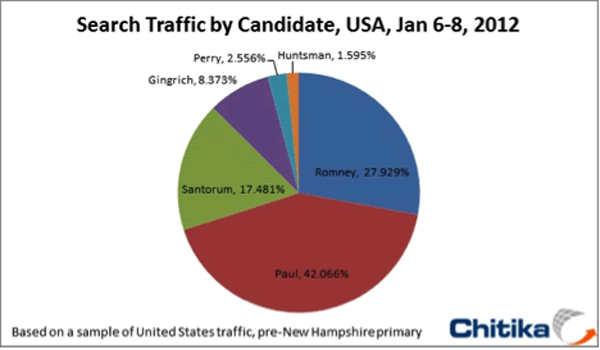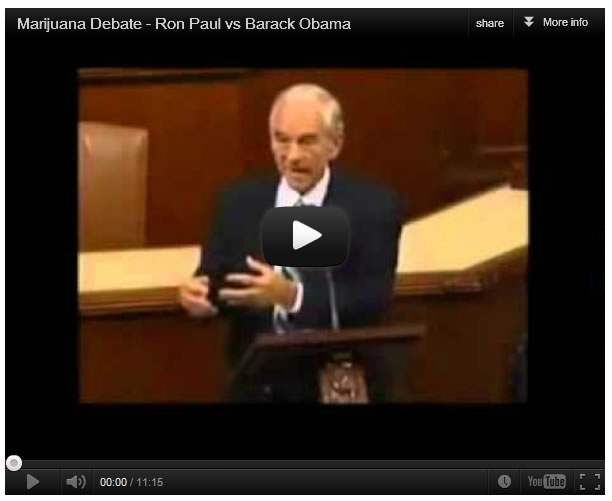Ron Paul's U.S. Presidential Election 2012 Lesson: Obeying the Constitution, No Sure Path to Freedom
Politics / US Politics Nov 07, 2012 - 03:00 AM GMTBy: Jeff_Berwick
 Justin O’Connell writes: What is one to deduce from the 2012 Presidential elections? In my opinion, it is that obeying the Constitution is no sure path to freedom, and that voting is a real waste of time. The campaign of Ron Paul was by far one of the most popular campaigns in recent memory. It made the third party runs of Ross Perot (18% of the vote in 1992; 8.4% of vote in 1996) and Ralph Nader (.38% of the vote in 2004) appear tiny. Nobody in recent memory has captured the heart of a lost-but-looking-USA quite as much as has Paul.
Justin O’Connell writes: What is one to deduce from the 2012 Presidential elections? In my opinion, it is that obeying the Constitution is no sure path to freedom, and that voting is a real waste of time. The campaign of Ron Paul was by far one of the most popular campaigns in recent memory. It made the third party runs of Ross Perot (18% of the vote in 1992; 8.4% of vote in 1996) and Ralph Nader (.38% of the vote in 2004) appear tiny. Nobody in recent memory has captured the heart of a lost-but-looking-USA quite as much as has Paul.
Look at the search traffic by Republican candidate just ten months ago:

And now Romney is in a virtual tie with Obama. Based on this data alone, Paul would be beating Obama by a considerable margin. Unfortunately, the search traffic data presumes accounts for the younger generations, whereas it is generally the older generations who vote. Nonetheless, the US political system did not let a Ron Paul campaign get far enough to worry about that. He should have gone as far as any candidate, considering most of his views align much more with a broad popular base in the US than does Obama or Romney. But, Obama has still got the lingering hangover of a cult of personality, and Romney got the nod from the Republican Party brass thanks to his elitist proclivities.
Clearly detached from the two-party duopoly, Paul went about his election campaign and overall freedom agenda in all of the Constitutional ways. He ran under the moniker of the Republican Party and discussed US Empire and the Constitution's role in governance, only to be sidelined by a corporate media controlled by the Keystone State-enterprise players that control both mainstream parties. Paul was scarcely even awarded his First Amendment right to free speech, muted by the tight-lipped media world as he was. Despite that, he marched on as long as he could trying to change the political system from within.
His opinions on things as disparate as war and marijuana line up much more with the sentiment of the waking lion's share of US citizens than the opinions of Obama and Romney. That is a truism. But the "sadistic machine" was simply too much to overcome through an election. Along the way, some of the US's favorite celebrities came out in favor of Ron Paul in 2012. We can't forget Snoop Dogg's January endorsement of Paul.
While it is likely that, considering the post was made around 9:30pm at night, Snoop Dogg was high on marijuana, the celebrity has never gone back on his sentiment while sober. That Snoop Dogg agrees with himself while high on marijuana, as well as sober, goes to show that marijuana is what comedian-Libertarian Doug Stanhope (and Ron Paul supporter) would qualify as a "good drug." Therefore, Ron Paul's stance on marijuana is the correct stance, and legalizing it is thus the sane step to take. But, really, Ron Paul's sentiment echoes that of Stanhope's in this clip:
The War on Drugs has created a monster of a machine that has locked up millions of people over the years for non-violent crimes. Still, drugs are cheaper and violence is up. Half of high school seniors have smoked marijuana. And they're probably better off for it. The alternative was to sit sober inside a worldview born of indoctrination and without any hope of seeing over the mountains of stifling institutions put upon them by their masters. Barack Obama still thinks the government can brainwash people out of smoking the naturally occurring substance marijuana, the US's drug bogeyman of choice. Ron Paul believes that, in a free society, we can trust most people to make non-violent decisions regarding their own personal drug use (at least as many as we trust now to handle their use of alcohol, probably more).
Currently, the slaves in the US are voting in three states regarding the legalization of marijuana; that is, not the legalization of medical marijuana, but the legalization of marijuana at the retail level. Oregon, Washington, and Montana are all looking to make marijuana legal. Voter fraud and slavish voters will probably mean that this does not become a reality. After all, the government would rather the people drown their brains with alcohol than thought-provoking THC. Maybe plenipotentiaries sent from the White House will ensure these measures don't pass. But, in a Ron Paul US, they certainly would not face any opposition from totalitarian federal government. The states would reserve their right to choose.
The people are on the side of Ron Paul, and have been since the beginning of this election cycle. The issue is that the US political system cannot allow opposition to the party line, not a lack of popularity.
Let us not forget the time when Kelly Clarkson was met with backlash after her Twitter endorsement of Paul. Still, her album sales spiked 400% in the wake of the endorsement, showing Ron Paul's place in the hearts and minds of the US. Perhaps some endeavouring entrepreneurs could open up a Ron Paul celebrity exchange betting on the performance of a celebrities work based on whether a Paul endorsement arises in a timely manner.
Despite the popular support, despite the cross-party appeal, despite the likable personality (what, with his white tennis shoes and suit) and familial ties to politics (Rand Paul), Ron Paul could not pierce the veil. He did not expect to either. He is an experienced man who knows the inner-workings of the System, and what he represents must remain muted for the coming centuries. Still, he knows that the ideas he forwards will win the election. They always do, until the people are swept up in the rebellion-esque mania of the next US election and made to conform to the two party suffocation.
This was it, USA. Even some of the most pessimistic of analysts regarding the socio-historical/economic fate of the US still held out that, if Ron Paul won this election (Yes...Win!), there might be a way to stem the tide of elitist revolution. But, that opportunity - if it ever was one - has vanished.
Constitutionalists often cite the Thomas Jefferson refrain that the people need revolutions. He has spoken of this belief in numerous ways, such as in a letter to James Madison after Shay's Rebellion:
"I hold it that a little rebellion now and then is a good thing, and as necessary in the political world as storms in the physical. Unsuccessful rebellions, indeed, generally establish the encroachments on the rights of the people which have produced them. An observation of this truth should render honest republican governors so mild in their punishment of rebellions as not to discourage them too much. It is a medicine necessary for the sound health of government."
Thomas Jefferson also said that when a goal's outcome became unlikely, such as the goals of the Constitution when considered in the present, one should not change the goals, but rather change the course of action. It is now time to change our founders' course of action. I think they would concur. If not, forget them. And forget their ultimately useless corpse of a Constitution, too.
Philosophers have longed dedicated powers of ratiocination to the question of where psychology ends and action begins. Our human cognitive niche informs us that they are, in some ways, the same thing. Thinking is action, and action is thinking. The nature of the thought-action, however, rests on whether it is inactive or proactive. While the former represents the theory-heavy procrastination of wordplay, the latter represents a mélange of theory and living. The theory of the doer is always tested, and, due to his/her predisposition towards living (action), the Constitution as writing on a piece of paper is nothing to defend. What is to defend, however, is the "Constitution" of living itself.
And the constitution of living does not need to be determined by borders. National sovereignty merely means politically centralized, top-down, weapons-enforced claims of humans born in certain regions. This is an utterly obsolete practice, and the world knows it. That's why the Ron Paul revolution is just beginning.
The Ron Paul revolution was not contained in an election. The powers that be certainly wish it had been. Instead, the Ron Paul is a worldwide phenomenon. Lew Rockwell has mentioned that Brazilians tell him Ron Paul could run for president there. In Poland, during a Mitt Romney visit, the people were parading Ron Paul signs.
In other elections, when a candidate loses, either long before the general election or during the general election, their supporters fall to the wayside, and are no longer supporters of their once-candidate. How many Al Gore supporters are out there today? John Kerry? None.
Ron Paul supporters? Millions still.
Anarcho-Capitalist. Libertarian. Freedom fighter against mankind’s two biggest enemies, the State and the Central Banks. Jeff Berwick is the founder of The Dollar Vigilante, CEO of TDV Media & Services and host of the popular video podcast, Anarchast. Jeff is a prominent speaker at many of the world’s freedom, investment and gold conferences as well as regularly in the media.
© 2012 Copyright Justin O’Connell - All Rights Reserved Disclaimer: The above is a matter of opinion provided for general information purposes only and is not intended as investment advice. Information and analysis above are derived from sources and utilising methods believed to be reliable, but we cannot accept responsibility for any losses you may incur as a result of this analysis. Individuals should consult with their personal financial advisors.
© 2005-2022 http://www.MarketOracle.co.uk - The Market Oracle is a FREE Daily Financial Markets Analysis & Forecasting online publication.





